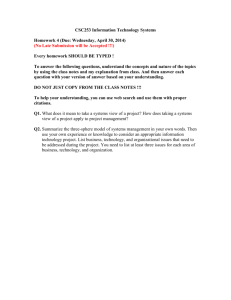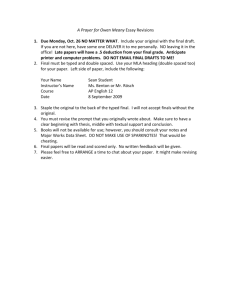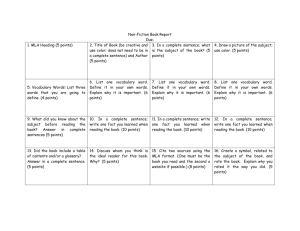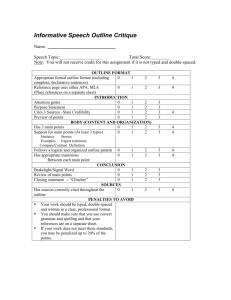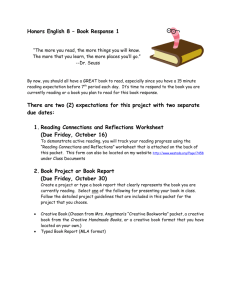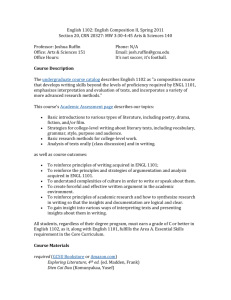(4) pieces + Reflective Letter – due Wednesday, April 24
advertisement
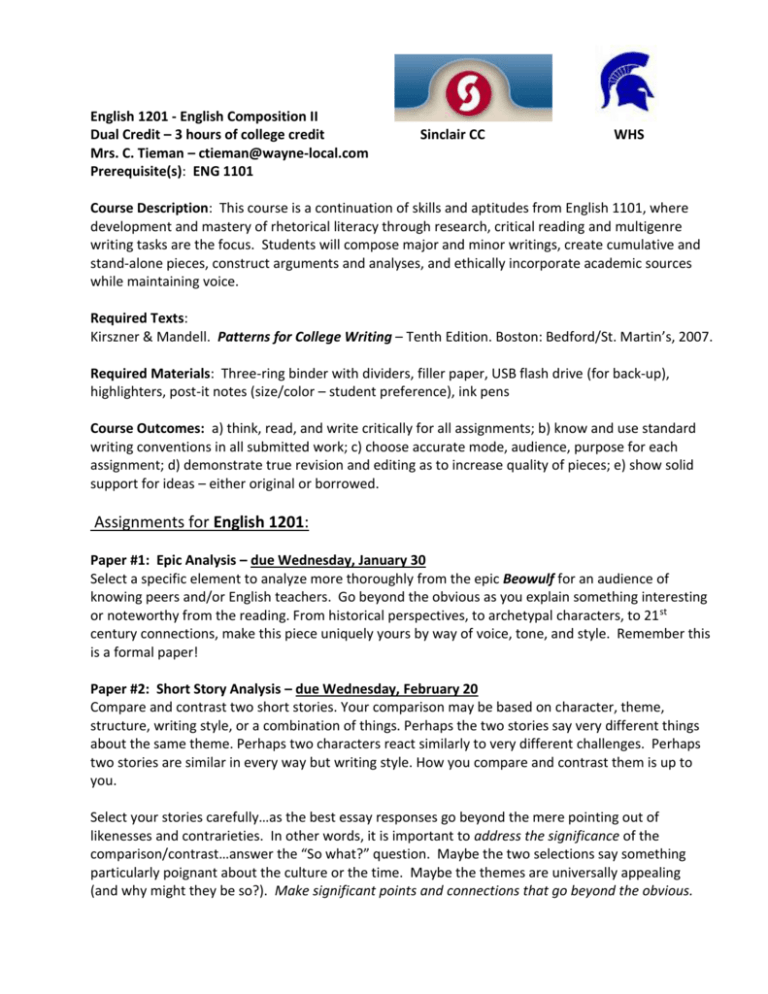
English 1201 - English Composition II Dual Credit – 3 hours of college credit Mrs. C. Tieman – ctieman@wayne-local.com Prerequisite(s): ENG 1101 Sinclair CC WHS Course Description: This course is a continuation of skills and aptitudes from English 1101, where development and mastery of rhetorical literacy through research, critical reading and multigenre writing tasks are the focus. Students will compose major and minor writings, create cumulative and stand-alone pieces, construct arguments and analyses, and ethically incorporate academic sources while maintaining voice. Required Texts: Kirszner & Mandell. Patterns for College Writing – Tenth Edition. Boston: Bedford/St. Martin’s, 2007. Required Materials: Three-ring binder with dividers, filler paper, USB flash drive (for back-up), highlighters, post-it notes (size/color – student preference), ink pens Course Outcomes: a) think, read, and write critically for all assignments; b) know and use standard writing conventions in all submitted work; c) choose accurate mode, audience, purpose for each assignment; d) demonstrate true revision and editing as to increase quality of pieces; e) show solid support for ideas – either original or borrowed. Assignments for English 1201: Paper #1: Epic Analysis – due Wednesday, January 30 Select a specific element to analyze more thoroughly from the epic Beowulf for an audience of knowing peers and/or English teachers. Go beyond the obvious as you explain something interesting or noteworthy from the reading. From historical perspectives, to archetypal characters, to 21 st century connections, make this piece uniquely yours by way of voice, tone, and style. Remember this is a formal paper! Paper #2: Short Story Analysis – due Wednesday, February 20 Compare and contrast two short stories. Your comparison may be based on character, theme, structure, writing style, or a combination of things. Perhaps the two stories say very different things about the same theme. Perhaps two characters react similarly to very different challenges. Perhaps two stories are similar in every way but writing style. How you compare and contrast them is up to you. Select your stories carefully…as the best essay responses go beyond the mere pointing out of likenesses and contrarieties. In other words, it is important to address the significance of the comparison/contrast…answer the “So what?” question. Maybe the two selections say something particularly poignant about the culture or the time. Maybe the themes are universally appealing (and why might they be so?). Make significant points and connections that go beyond the obvious. Three (3) to Four (4) typed pages, MLA format (remember to use present verb tense when analyzing literature and that authors should be referred by their full names in the introduction. Thereafter, just the last name will suffice.) ------------------------------------------------------------------------------------------------------------------------------ESSAY #3: Poetry Analysis – due Wednesday, March 13 Choose a poem (from the selected list) and reveal its literal and interpretive connotations. Use TPCASTT (see handout) to aid in the process of peeling back the layers of meaning. (Note: It may be necessary to review poetic devices or at least have a reference handy!) “Birches” or “Mending Wall” by Robert Frost “Aubade” by Philip Larkin “Wuthering Heights” or “Spinster” by Sylvia Plath “Telephone Conversation” by Wole Soyinka “Spring and All” by William Carlos Williams “Sailing to Byzantium” by William Butler Yeats “War is Kind” by Stephen Crane “Diving into the Wreck” by Adrienne Rich “The Fish” by Elizabeth Bishop “The Story We Know” by Martha Collins “A Blessing” by James Wright “Rite of Passage” by Sharon Olds “The Waking” by Theodore Roethke “The Indifferent” by John Donne “The History Teacher” by Billy Collins Three (3) to Four (4) typed pages, MLA format ESSAY #4: The Soundtrack of Your Life Analysis– due Wednesday, April 10 Reflect upon the importance of music in your life. Consider the ways in which music has affected you. It can instantly put you in touch with powerful memories of specific people, relationships, places, events, experiences, and emotions. Closely examine the role that music has played in your life and reflect on its importance to you now. To do so, select 3-5 songs that have particular meaning for you. Print out the lyrics to each song and analyze the words. Be sure to reference specific lines in the lyrics that are particularly powerful or insightful. Tell what importance each song in your “soundtrack” has had on the course of your life. Be specific and clear in your explanations and connections. Enjoy! Three (3) to Four (4) typed pages, MLA format (remember to use present verb tense when analyzing music and that lyricists should be referred by their full names in the introduction. Thereafter, just the last name will suffice.) PORTFOLIO: Final copies of all four (4) pieces + Reflective Letter – due Wednesday, April 24 Writing Center: A minimum of four (4) writing center conferences are required for the semester. You may select any four (4) pieces of writing to focus on the revisions. Prepare several targeted questions or areas of concern prior to each visit to the Writing Center and have the WC tutor sign off on each of the “Writer’s Agenda” forms. Be sure to turn in your WC forms along with the rest of the drafts and final papers so I can follow your process approach! Due Dates: Email or hand deliver all writing to me before or on the due dates given. (Expect a deduction of points for late work.) All prior drafts must be submitted along with the final (also include the WC forms, if completed), and all final pieces must be typed in MLA style. The end of term portfolio includes all pieces as well as a reflective letter. Sinclair Community College - English Department Grading Scale: 100-93 = A 92-86 = B 85-75 = C 74-68 = D 67-0 = F Paper Criteria: Refer to the attached rubric for each paper assessment and evaluation. Plagiarism: The Sinclair English Department states that plagiarism is the misuse of source materials and is unacceptable in student work. At the discretion of the instructor, the penalty for plagiarism may be a grade of zero credit (“F”), with NO OPPORTUNITY TO REWRITE. Subsequent plagiarism shall be grounds for failure of the course itself. Plagiarism is cheating. It is unethical and a violation of the Honor Code.
